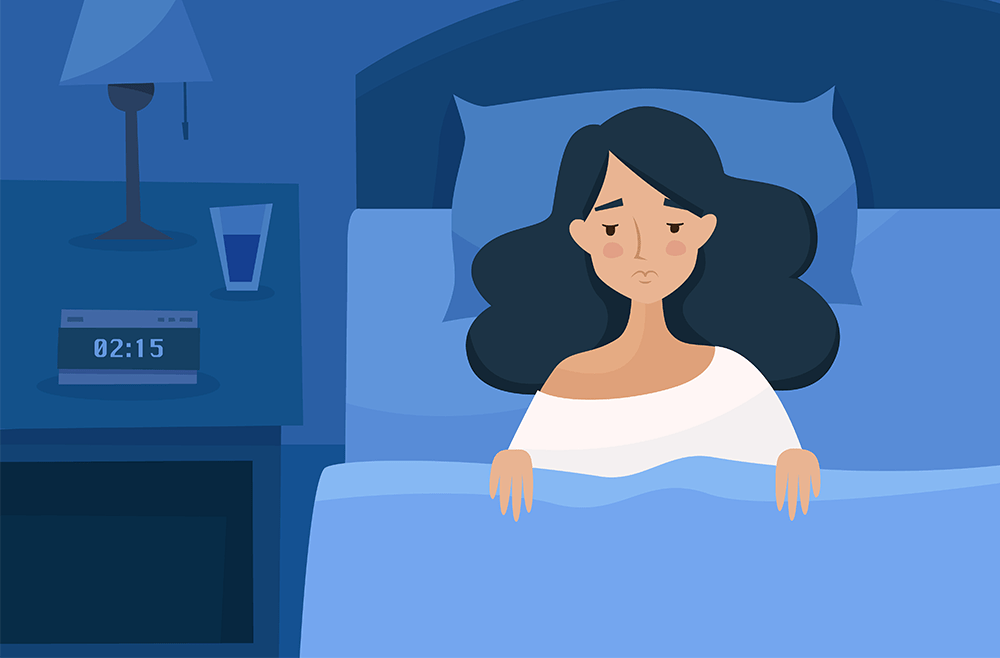Sleep disorders such as sleep apnea and insomnia affect millions of people worldwide, causing disrupted sleep, daytime fatigue, and a host of other health problems. Thankfully, there are a variety of treatment options available to help manage these conditions and improve overall sleep quality. In this blog, we will explore sleep apnea and insomnia treatment options, so you can get the restful, restorative sleep you need to feel your best.
Contents
What Is Sleep Apnea And Insomnia?
 Sleep apnea is a condition where a person’s breathing is repeatedly interrupted during sleep. This can happen because the muscles in the throat and tongue relax too much, causing the airway to narrow or close completely. As a result, the person may wake up multiple times during the night to catch their breath, even if they do not remember doing so. Symptoms of sleep apnea can include loud snoring, gasping or choking during sleep, daytime sleepiness or fatigue, and difficulty concentrating.
Sleep apnea is a condition where a person’s breathing is repeatedly interrupted during sleep. This can happen because the muscles in the throat and tongue relax too much, causing the airway to narrow or close completely. As a result, the person may wake up multiple times during the night to catch their breath, even if they do not remember doing so. Symptoms of sleep apnea can include loud snoring, gasping or choking during sleep, daytime sleepiness or fatigue, and difficulty concentrating.
Insomnia, on the other hand, is a condition where a person has difficulty falling asleep or staying asleep. This can be due to a variety of factors, such as stress, anxiety, depression, certain medications, or disruptions in the sleep environment. Insomnia can be acute (short-term) or chronic (long-term) and can have a significant impact on a person’s mood, energy level, and overall health.
Sleep apnea and insomnia are two distinct sleep disorders that can have significant impacts on a person’s quality of life and health.
Therapy Treatment For Sleep Apnea And Insomnia
Sleep apnea and insomnia treatment options include medical interventions, lifestyle changes, and self-care strategies. Moreover, therapy can be a first-line treatment. Some of them are:
CPAP therapy
Continuous Positive Airway Pressure (CPAP) therapy is considered the gold standard treatment for moderate to severe sleep apnea. CPAP involves wearing a mask over the nose and/or mouth while sleeping. The mask is connected to a machine that delivers a continuous stream of air to keep the airway open, preventing breathing interruptions during sleep. CPAP therapy can be effective in reducing snoring, improving sleep quality, and reducing daytime sleepiness.
Oral Appliance Therapy
This treatment involves wearing a custom-fitted oral device that repositions the jaw and tongue to keep the airway open during sleep. Oral appliance therapy is generally recommended for mild to moderate sleep apnea or for people who cannot tolerate CPAP therapy. These devices are designed to be comfortable and easy to use and can be effective in reducing snoring and improving sleep quality.
Lifestyle changes
 Certain lifestyle changes can be helpful for both sleep apnea and insomnia. Losing weight, avoiding alcohol and sedatives, quitting smoking, and establishing a regular sleep routine are all examples of lifestyle changes that can improve sleep quality. Exercise, particularly aerobic exercise, can also help improve sleep quality and reduce symptoms of sleep disorders.
Certain lifestyle changes can be helpful for both sleep apnea and insomnia. Losing weight, avoiding alcohol and sedatives, quitting smoking, and establishing a regular sleep routine are all examples of lifestyle changes that can improve sleep quality. Exercise, particularly aerobic exercise, can also help improve sleep quality and reduce symptoms of sleep disorders.
Cognitive Behavioral Therapy
This therapy involves working with a therapist to identify and change negative thoughts and behaviors that may be contributing to insomnia or sleep apnea. CBT can include techniques like relaxation training, sleep restriction therapy, and cognitive restructuring. CBT is considered a safe and effective treatment option for insomnia, particularly for people who prefer non-medication approaches.
Reflexology and Acupuncture
These alternative therapies involve applying pressure to specific points on the body to help reduce stress, promote relaxation, and improve sleep. Reflexology involves applying pressure to specific points on the feet, while acupuncture involves inserting thin needles into specific points on the body. Both of these therapies are generally considered safe and may help reduce symptoms of sleep disorders.
Social Rhythm Therapy
This therapy involves establishing and maintaining a regular sleep schedule, which can be helpful for insomnia and other sleep disorders. This can involve setting a regular bedtime and wake-up time, avoiding naps, and establishing a relaxing bedtime routine. Social rhythm therapy can also involve managing exposure to light, which can affect the body’s natural sleep-wake cycle.
Medications For Sleep Apnea And Insomnia
There are several medication treatments available for sleep apnea and insomnia. Here are some examples of medication treatments for sleep apnea and insomnia:
Sleep Apnea Medications
 There are currently no medications that can cure sleep apnea. However, some medications can reduce symptoms of sleep apnea, such as excessive daytime sleepiness. Stimulant medications, such as modafinil or armodafinil, can help promote wakefulness during the day. Additionally, some antidepressant medications, such as tricyclic antidepressants or selective serotonin reuptake inhibitors (SSRIs), help reduce symptoms of sleep apnea, such as snoring.
There are currently no medications that can cure sleep apnea. However, some medications can reduce symptoms of sleep apnea, such as excessive daytime sleepiness. Stimulant medications, such as modafinil or armodafinil, can help promote wakefulness during the day. Additionally, some antidepressant medications, such as tricyclic antidepressants or selective serotonin reuptake inhibitors (SSRIs), help reduce symptoms of sleep apnea, such as snoring.
Insomnia Medications
Several types of medications treat insomnia, including benzodiazepines, nonbenzodiazepines, and melatonin agonists. Benzodiazepines, such as lorazepam or temazepam, are typically short-term treatments for insomnia, as they can be habit-forming and have the potential for side effects. Nonbenzodiazepines, such as zolpidem or eszopiclone, also treat insomnia and are generally considered safer than benzodiazepines. Melatonin agonists, such as ramelteon, are a newer class of medication to treat insomnia and work by promoting the natural sleep hormone, melatonin.
It’s important to note that medication should not be the first-line treatment for sleep apnea or insomnia. You must consider other non-medication approaches first. Additionally, use medication only under the guidance of a healthcare professional. Some medications can have side effects or may not be appropriate for everyone.
Self-Treatment For Sleep Apnea And Insomnia
 While it’s important to work with a healthcare professional to develop a personalized treatment plan for sleep apnea and insomnia, some self-care strategies can help manage these conditions. Here are some examples of self-treatment options for sleep apnea and insomnia:
While it’s important to work with a healthcare professional to develop a personalized treatment plan for sleep apnea and insomnia, some self-care strategies can help manage these conditions. Here are some examples of self-treatment options for sleep apnea and insomnia:
- Healthy Sleep Habits: One of the most important things you can do for sleep apnea and insomnia is to establish healthy sleep habits. This includes going to bed and waking up at the same time every day, creating a relaxing bedtime routine, avoiding caffeine and alcohol before bedtime, and keeping your bedroom cool, dark, and quiet.
- Weight Management: In some cases, excess weight causes sleep apnea. Hence, losing weight through a healthy diet and exercise can help to reduce symptoms of sleep apnea. Even small amounts of weight loss can help improve sleep quality and reduce daytime sleepiness.
- Exercise: Regular exercise can help improve sleep quality and reduce symptoms of sleep apnea and insomnia. Aim for at least 30 minutes of moderate-intensity exercise most days of the week, such as brisk walking or cycling.
- Stress Reduction: Stress can be a major contributor to insomnia, so it’s important to find ways to manage stress in your life. This can include relaxation techniques, such as deep breathing or meditation, yoga, or other forms of exercise.
- Sleep Position: For people with sleep apnea, sleeping on your back can make symptoms worse. Try sleeping on your side instead to help keep your airway open during sleep.
- Avoidance of Stimulants: Avoid consuming caffeine, nicotine, or alcohol before bedtime, as they can interfere with sleep quality and contribute to insomnia.
Conclusion
In conclusion, sleep apnea and insomnia are two common sleep disorders that can have a significant impact on quality of life. There are several treatment options available, including continuous positive airway pressure therapy, oral appliance therapy, medication, and lifestyle changes. It’s important to work with a healthcare professional to develop a personalized treatment plan that takes into account your individual needs and preferences. If you’re struggling with symptoms of sleep apnea or insomnia, don’t hesitate to seek help. With proper treatment, many people can improve their sleep quality and reduce daytime symptoms.
For more information, please contact MantraCare. Sleep is an essential part of our daily routine and it plays a significant role in maintaining a healthy body and mind. If you have any queries regarding Online Insomnia Counseling experienced therapists at MantraCare can help: Book a trial therapy session.


